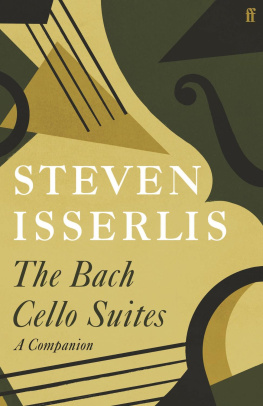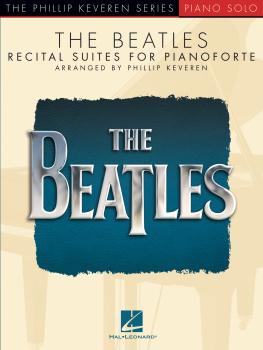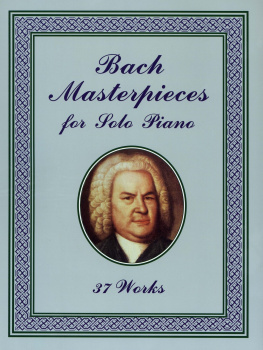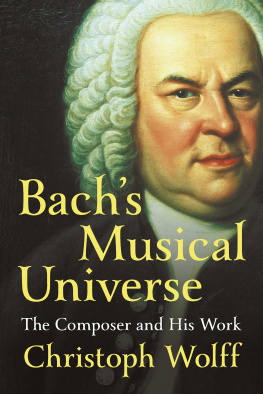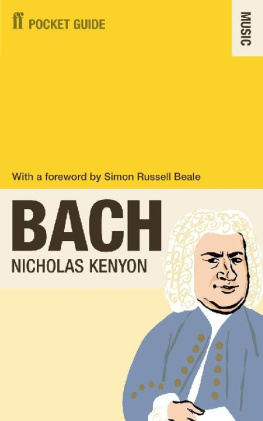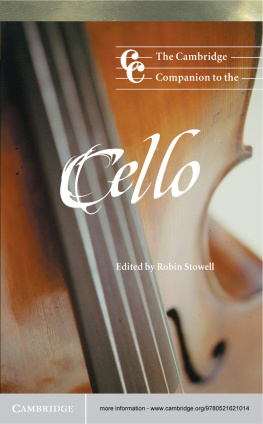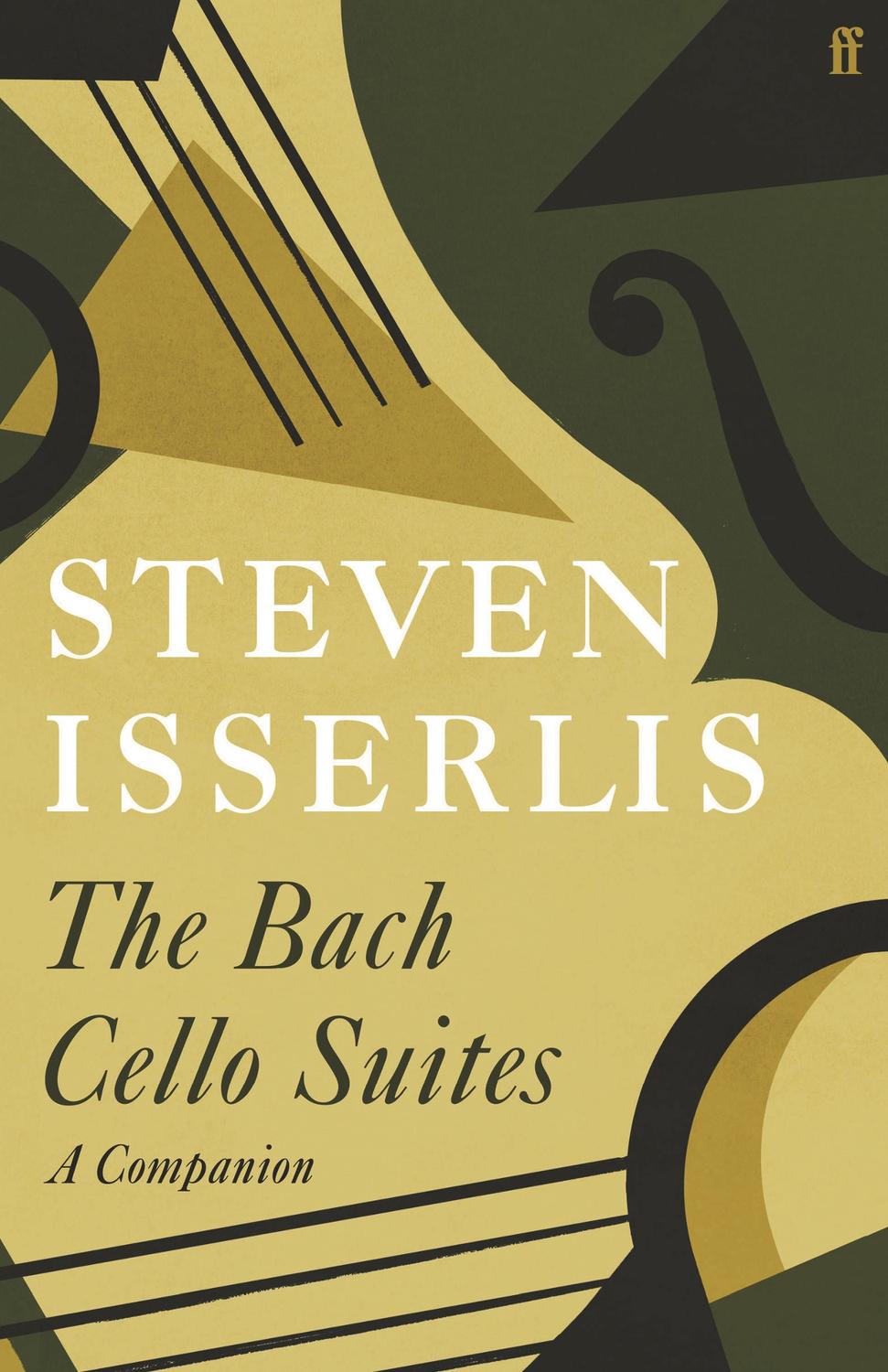This book is intended for music-lovers of all shapes and sizes, ranging from the casual listener to the performing musician. My simple aim is to amplify, if possible, the enjoyment and understanding of those listening to Bachs cello suites by offering my own, very personal, observations on the music. Everyone who loves the suites will have his or her own views, which may be radically different from mine; thats fine as it should be, in fact. Mine are constantly changing, and will continue to do so long after this book is in print again, that is to be expected. Music as all-encompassing as this can be heard, seen, thought of, felt in an infinite variety of ways. My hope, ultimately, is that these reflections on the suites will be taken for what they are intended to be: a continuation of a discussion that will endure for as long as we listen to music as well as an act of homage to some of the greatest works ever composed.
I am no musicologist, and am deeply grateful to the authors of the many articles and books that have helped me form an overview of the history and provenance of the suites. This is not in any way an academic tome. If the reader can read music, so much the better; but it is not essential. There is, in a few places, some very basic analysis of key moments x within the suites, because that was the only way I could find to describe those passages; but those analyses are short and can be easily skipped, if theyre not to your taste. A glossary to be glossed over, perhaps is provided at the end of the book.
This is not really a volume to be read all at once, but rather one to be used as a friendly companion before or after listening to (or playing) the suites. Or in the case of Part 6, perhaps even horrors! How dare I suggest anything so sacrilegious? while doing so. Shame on me Id better begin the book proper forthwith, before I further offend the God of Music that is Bach. xi
It is extraordinary how Bachs cello suites, largely unknown for some two hundred years after their composition, have now captured the imaginations, minds and hearts of music-lovers all over the world. For cellists they represent a musical bible; for listeners, scarcely less. They are discussed, analysed, made the subject of fantasies, arguments and quarrels, appropriated by players of countless other instruments; and yet despite this overkill, and perhaps heightened by the lack of a manuscript in Bachs hand or any definite information about the circumstances of their composition, they maintain their air of pristine mystery.
The slightly frustrating thing about this sense of an inscrutable secret is that the suites themselves really arent that mysterious. They consist primarily of dance music, readily communicative, not especially complex; Bach, unlike some composers, did not seek to hide his message under a veil of convolution. It is, above all, deeply human music, telling an emotional story that should be easy to understand. So many editions (well over a hundred), so many recordings (well over two hundred) and too many words (probably millions) have somehow obscured the clarity of these wonderfully direct works. (This, of course, is why Ive recorded the suites xii and am writing this book. Hmm. At least Ive never done and shall never do an edition!) Is there a story behind the suites? Just possibly (more on that later). But above all, they consist of pure, unbelievably beautiful music, written by an eminently practical composer for the most basic of forces: one player on four strings, with a bow. They are inexhaustibly moving, because that composer was an incomparable genius who mastered every genre to which he turned his attention, blessed with a (musical) heart and vision that overflowed with just about every emotion known to man or woman except, perhaps, for embarrassment
As you can probably gather from the above, my reaction to the suites is essentially an instinctive one. Of course, I study and read about them endlessly; every scrap of knowledge can help form an interpretation, and may perhaps add conviction to ones performance. Ultimately, though, the truth lies within the music, not in anything outside it; and it is chiefly the emotional/dramatic/spiritual narrative of the suites, taking us on a vast journey, from peaceful meditation through deepest suffering to radiant exaltation, that I intend to examine here.
First of all, however, some history, most of which I have gleaned, magpie-like, from various distinguished scholars. And a most fascinating if at times bewildering history it is
Johann Sebastian Bach was born in the town of Eisenach (where Martin Luther had attended school about 190 years earlier) in 1685, on what was then 21 March but now, thanks to the change to the Gregorian calendar, answers to the name of 31 March. Bachs family were almost all musicians; particularly appropriate, since their surname aside from meaning brook is one of the few that can be entirely converted into musical notes (in the German system the letter B is used for the note we know as B flat, the letter H for our B natural). Orphaned before the age of ten, little Bach was taken in by an elder brother, Johann Christoph, an organist, who made a start on J. S.s musical education; it can be assumed that the latter was a more than willing pupil. The obituary published a few years after Bachs death written by Johann Friedrich Agricola, a musical theoretician, in collaboration with the most famous of Bachs four renowned composer sons, Carl Philipp Emanuel tells us a rather charming, if sad, story. Shortly after commencing his studies, little Johann Sebastian longed to play more challenging pieces than those his brother was giving him. Having espied a manuscript volume of promising-looking keyboard works belonging to Johann Christoph, he begged to be allowed to learn them. His brother sternly prohibited it, and shut the volume away in a bookshelf secured with a latticed front. He had not reckoned, however, with the delicacy of little Bachs hands; waiting until his brother was safely in bed, Johann Sebastian would steal up to the cupboard, push his fingers through the small holes, roll up the volume and extract it. Although he was not allowed a candle of his own (his brother sounds as strict as any father), he would copy the music on nights during which the moon shone through his window. Alas, scarcely had he completed the mammoth task, which had taken him six months, when Johann Christoph found out, and as a punishment hid both original and copy; our Bach had to wait many years, until after his brothers lamented death, before he could recover them.
Despite this setback, J. S.s musical studies must have progressed brilliantly, and in 1703 he was engaged for his first proper job, as organist in the town of Arnstadt. It cannot be said to have gone smoothly, however. Bach was perhaps not the ideal employee: aside from his gripes about the musical idiocies of the town council, he managed during this time to get into an unseemly brawl with a bassoonist, who accused him of having insulted both his playing and his instrument; to take three months unauthorised leave; to quarrel with various students; and ahem to be accused of inviting a stranger maiden to make music (!) in the church. (In later life, Bach forbade the telling of many stories from his early life. I wonder what else happened?) Furthermore, the council complained that at the organ Bach mingled many strange tones to the chorale, thereby confusing the congregation. It must have been rather a relief to some of the Arnstadt councillors, if not to the music-lovers, when in 1707 Bach resigned and went to take up a new job in nearby Mhlhausen. Here, once his new employers had mastered his admittedly complicated surname (in the first of the few surviving documents they call him Herr Pach, in the second Herr Bache), things seem to have gone better. Nevertheless, the following year he accepted a more lucrative and prestigious offer of employment in a major town, Weimar, where he was to remain until 1717. Despite the brevity of Bachs stay in Mhlhausen, one very important event in his life occurred there: he married his second cousin, Maria Barbara Bach.

